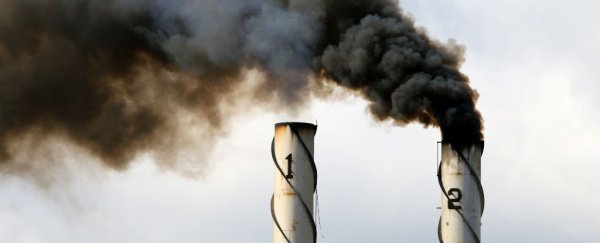A test facility in China has successfully converted exhaust emissions into oil, pointing to the possibility of turning the tonnes of harmful gases emitted by power stations, steel mills, and garbage dumps each year into something we can actually use.
"We have pieced the system together into an integrated system, where you put gas in one end and get a liquid fuel out of the other end," one of the team, Gregory Stephanopoulos from MIT, told The Guardian.
The pilot plant, which is located just outside Shanghai, has now completed a successful trial run that was launched back in September 2015. Now a 'semi-commercial' demonstration plant, 20 times the size, is about to begin construction so the team can see if their system works as effectively when scaled up.
"It is one thing to do it on a scale of 1-2 litres in the lab, but a different story to move up 1,000 litres and then 20,000 litres in the demonstration plant," says Stephanopoulos.
The system works using bacteria to convert a mixture of hydrogen, carbon monoxide and carbon dioxide gas called 'syngas' into acetic acid (concentrated vinegar). Genetically engineered yeast is then brought in to convert that into oil to be used as fuel.
If the team can show that the system can be scaled up to commercial levels and retain its efficiency (and as always, that's a big "if"), it could offer a way to not only recycle the tonnes harmful gases spewed forth from power plants and landfills, but also offer a more viable alternative to the biofuels that aim to replace fossil fuel.
"Energy-dense liquids are vital to transport but are currently derived from oil, a fossil fuel, and transport produces about a quarter of the global carbon emissions driving climate change," Damian Carrington explains at The Guardian. "Biofuels have been seen as possible replacement, but current biofuels compete with food production and have been blamed for driving up food prices."
The benefit of using waste gases is that literally no one else knows what to do with it. Other plants around the world, such as this new waste-to-energy plant planned for China, are experimenting with burning waste gas to produce energy, but Stephanopoulos argues that this is a very expensive process to run, plus it's not actually that great for the environment.
We'll have to wait for the results from the new demonstration plant in China to see if the team can successfully scale their system up to a commercially viable level, but it seems if they can't do it, other research teams just might.
The Guardian cites two US-based companies that are currently testing their own 'gas-to-liquid-fuel' systems, when means it's looking more and more likely that this could be yet another serious threat to ever-shortening lifespan of the fossil fuel industry.
The research has been published in the Proceedings of the National Academy of Sciences.
